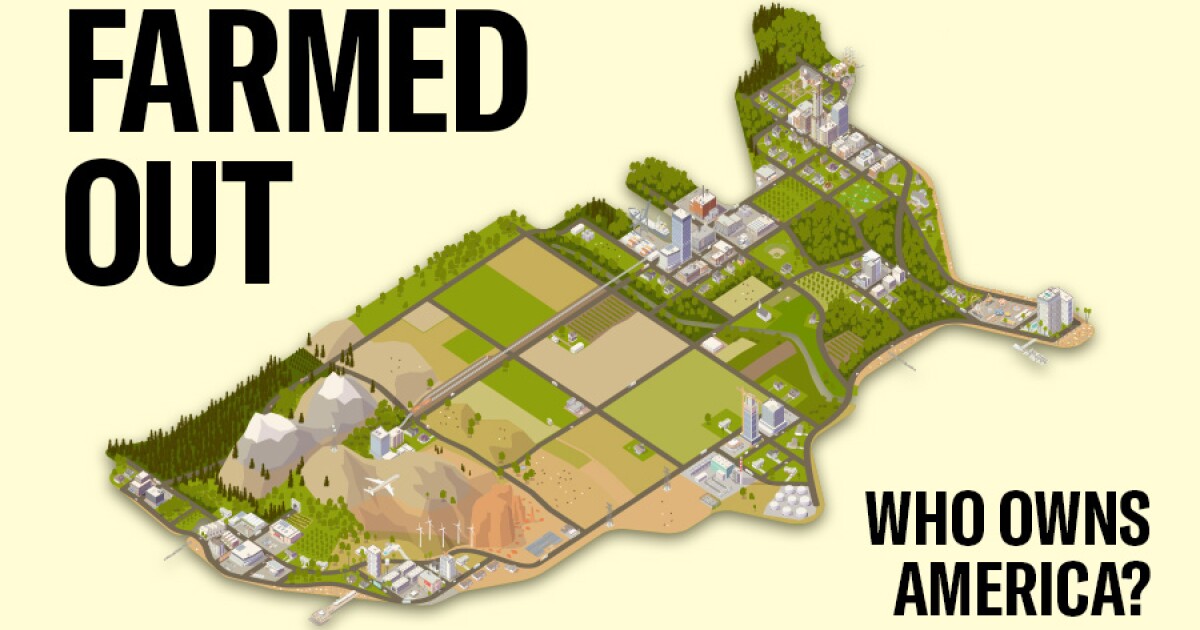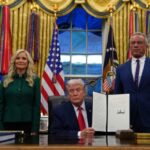

While much of the conversation about challenges posed by Chinese land ownership has focused on purchases near U.S. military bases, one issue has gone somewhat under the radar.
A growing number of legislators and experts have also raised alarms about potential national security risks posed by Chinese leverage over U.S. agriculture.
WHO OWNS AMERICA? SHORTCOMINGS IN CHINESE FOREIGN OWNERSHIP DATA
‘Food security is national security’
Rep. Dan Newhouse (R-WA) told the Washington Examiner that there are “obviously national security concerns” related to Chinese ownership of U.S. farmland, noting that “if they are in close proximity to a sensitive military installation or other piece of infrastructure,” then it’s “certainly” a problem.
But he said food security was also a big concern.
“My original focus was on the food production side of the equation,” Newhouse said. “Them getting any kind of control over any link in our supply chain when it relates to the supply of food … could be an area of vulnerability at some time in the future, whether it’s in times of shortage, where likely the production from those areas would be exported to China and not used domestically, or could perhaps be used strategically in case of a conflict between China and the United States or one of our allies.”
The sentiment appears to have bipartisan appeal.
Daleep Singh, the former deputy national security adviser for international economics on the Biden National Security Council,told the Senate he believed that “food security is economic security” and “food security is national security.”
Joseph Glauber, senior research fellow at the International Food Policy Research Institute and former chief economist for the Department of Agriculture, said China’s land holdings in the United States are too small to threaten food shortages.
“Insofar as some sort of food security threat, I see none,” Glauber told the Washington Examiner.
Glauber noted the amount of food the U.S. exports to China dwarfs the amount of food Chinese entities can currently produce on the U.S. land they own.
“Without a doubt, foreign ownership of U.S. farmland poses a consequential risk to food security — and food security is national security,” Sen. Chuck Grassley (R-IA)said in January. Grassley noted that “nearly half” of U.S. farmland is owned by people aged 65 or older and added that “studies say nearly 100 million of these acres are expected to change ownership” over the next decade, which he described as a “red flag” for Congress to address.
The senatorproposed the “Food Security is National Security Act” in 2021, which would add the secretary of agriculture to the Committee on Foreign Investment in the United States, a panel that is supposed to focus on transactions, such as Chinese land purchases, which could threaten U.S. national security.
And the potential problems that foreign ownership of land can create for food security go beyond the risk that China could ship away too much American-grown food.
Some food security concerns have arisen when foreign entities buy agricultural land that they then convert to other uses.
Foreign companies have taken advantage of green energy tax incentives, for example, to buy up farmland and lease it out for wind turbines.
That cuts down on food production in ways that could disrupt at least local markets, if not have broader implications.
China seeks ‘leverage’ over US agriculture
The U.S.-China Economic and Security Review Commissionassessed in 2022 that because China can’t fix its own food security problems, it has gone to other countries in search of agricultural resources.
“The Chinese government’s domestic efforts are not enough to solve China’s problems” with farm production at home, the commission found, so “China has also gone abroad to address its needs through investments and acquisitions of farmland, animal husbandry, agricultural equipment, and intellectual property, particularly of genetically-modified seeds.”
The commission said the U.S. “is a global leader in all of these fields, making it a prime trading partner and often a target of China’s efforts to strengthen its agriculture sector and food security, sometimes through illicit means.” It warned that China’s efforts “present several risks to U.S. economic and national security.” And it added that “if further consolidations and Chinese investments in U.S. agricultural assets take place, China may have undue leverage over U.S. supply chains.”
Like in the technology sector, intellectual property has factored into the concerns about China’s involvement in the agricultural sector.
That’s because China could uncover information about how American farmers and corporations develop seeds and produce larger yields.
“China’s access to U.S. agricultural IP may also erode U.S. competitiveness in agriculture technology that supports food production,” the commission said. “Additionally, China’s illicit acquisitions of genetically-modified seeds provides a jumpstart to China’s own development of such seeds, deprives U.S. companies of revenue, and offers an opportunity to discover vulnerabilities in U.S. crops.”
FBI sounds ‘alarm’ over Chinese theft
FBI Director Christopher Wray traveled to the Omaha, Nebraska, field office in August, where hespoke about combating threats to U.S. farm production.
“If the agriculture sector ever suffers a serious cyber disruption, the effects will be felt across the country and across the spectrum — from the farms in your states to dinner tables across America,” Wray said.
Wrayspoke about the Chinese threat to U.S. agriculture and to the U.S. economy as a whole in October 2022 following the arrest of nearly a dozen Chinese intelligence officers accused of meddling in U.S. affairs.
The FBI director said China’s targets included businesses “in almost every sector,” including agriculture.
“Chinese scientists have in certain cases chosen to simply steal U.S. agriculture IP and technology rather than try to research and develop them themselves,” the U.S.-China Economic and Security Review Commission warned last year. “Agricultural IP theft could enable Chinese agribusinesses to undercut U.S. competitors on international seed markets.”
Chinese national Mo Hailong wasarrested in 2013 because he had “conspired to steal the trade secrets of several U.S. based seed manufacturing companies.” The FBIsaid, “The object of Mo’s five-year conspiracy was to steal proprietary corn seeds from fields in Iowa — and across the farm belt of the Midwest — and send them to China, where Mo’s employer, a Chinese corn seed company, was based.” The bureau said he had stolen “the valuable trade secrets” of DuPont Pioneer and Monsanto, major American seed makers.
The same day Mo was arrested, the FBIsaid, “two agricultural scientists from China were arrested and charged with trying to steal samples of rice seeds” from an Arkansas research facility.
‘More nefarious route’
The U.S.-China Economic and Security Review Commission also warned, “Agricultural genetic technologies present unique dual-use potential that may attract further economic espionage. While China’s main interest in obtaining GM seeds from the United States is in improving its crop yields, the potential weaponization of agricultural IP is possible. Using the genetic code data it has obtained on U.S. crops, China can strengthen its agricultural output by replicating years of U.S. research on its own farms, or it can take a more nefarious route.”
CLICK HERE TO READ MORE FROM THE WASHINGTON EXAMINER
The more nefarious route, the commission noted, could involve Chinese scientists experimenting on the American-made seed formulas until they turn those seeds into weapons to wipe out U.S. crops.
“The potential weaponization of genetically-modified organisms, like genetically-modified seeds, also poses a threat to U.S. economic and food security, which could be at risk if genetically-modified seed code is used to create a bioweapon,” the commission added.





